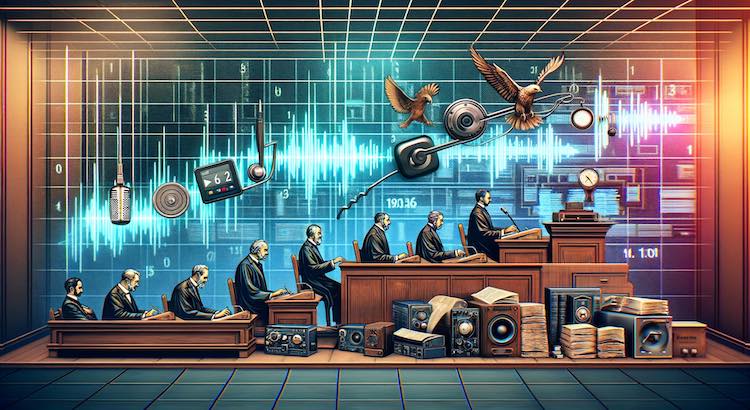The Evolution of Audio Transcription in the Legal Industry
The legal industry has a long tradition of adapting new technology to improve how cases are handled. One of the biggest changes in recent decades is the shift from manual note-taking to advanced audio transcription. Today, transcription services help lawyers, judges, and legal professionals by making court records more accurate and easier to use. Let’s explore how audio transcription has developed, its impact on legal work, and how it continues to shape case studies and legal documentation.
The Beginnings of Legal Transcription: Manual Methods
In the past, legal transcription relied on people to write or type every word spoken during court hearings, depositions, and interviews. Court reporters and legal secretaries would spend hours listening and typing to create accurate records.
- This approach was slow and often included mistakes due to human error.
- Transcripts took days or even weeks to create.
- Legal teams were delayed as they waited for finished documents.
Even when typewriters became popular, the process remained tough. Later, tape recorders allowed legal professionals to save audio for later transcription.
Technological Advances: Digital Recording and Early Automation
With the invention of digital audio recording, legal transcription entered a new era. Instead of relying on tape cassettes or handwritten notes, lawyers began using digital files that could be sent, stored, and shared simply.
- Digital audio is clearer, making it easier to create accurate transcripts.
- Files can be backed up and retrieved quickly.
- Electronic storage made searching and organizing records possible.
Still, someone had to manually listen and type the audio, but the work became far more manageable than before.
Breakthrough: Automated and AI-Powered Transcription
The introduction of automated transcription and AI tools brought dramatic changes in the 2010s and beyond. Today, advanced speech recognition software creates transcripts in hours—or even minutes.
- Recent studies show that AI platforms can achieve over 95% accuracy for clear audio (2023).
- Human transcribers still review and edit these files to ensure legal precision.
- Legal professionals can order transcription online, making the process even faster.
Searchable digital transcripts help lawyers, judges, and paralegals find facts quickly. This also streamlines legal research and case study analysis.
The Impact on Legal Proceedings and Documentation
Audio transcription helps legal teams by creating reliable, verbatim records of everything said in court or during interviews. Here’s how these changes make a difference:
- Fast delivery of transcripts helps lawyers prepare for trial more efficiently.
- High-quality transcripts serve as trusted records for evidence, appeals, and reference.
- Digital files can be shared instantly among legal teams, improving collaboration.
- Clients and the public have better access to legal information online, increasing transparency.
By reducing the time and cost needed to create documents, transcription also frees up legal budgets for other important work.
Case Studies: Real-World Transformation
Actual cases show how important digital transcription can be:
- During a multi-defendant lawsuit, each side could turn thousands of pages of digital transcripts into highlighted facts and evidence in a fraction of the normal time.
- In criminal law, perfect transcripts of police interviews and court hearings often become a key part of the defense or prosecution cases (2022 statistics show a 30% faster review process).
Having every word captured and searchable can be the deciding factor in a tough legal battle.
Beyond Courtrooms: The Expanding Role of Transcription
Audio transcription is valuable outside court, too. Here are a few ways transcription supports everyday legal work:
- Transcribing depositions, interviews, and witness statements for case files.
- Creating subtitles and closed captions for legal training videos and public briefings using subtitling services and closed caption services.
- Ensuring documents are error-free by using transcription proofreading services.
- Breaking down language barriers through audio translation service and text translation services.
These benefits help law firms serve more clients while staying compliant with regulations.
The Future: AI, Speed, and Integration
Experts predict even more change as artificial intelligence and machine learning improve. The next steps for legal transcription include:
- AI that understands complex legal vocabulary even better (2024 reports show rising accuracy for legal terms).
- Real-time transcription that keeps up with live court proceedings.
- Integration with case management tools, so transcripts and documents stay organized.
- Flexible options like an AI transcription subscription for frequent users.
All these advances mean legal professionals will continue to benefit from accurate, fast, and multilingual transcription as technology evolves.
Get Reliable Legal Transcription with GoTranscript
Precise audio transcription is now a core part of legal work—from improving case outcomes to making information accessible. GoTranscript offers a full range of transcription services designed for law firms, courts, and legal teams. Choose affordable transcription pricing, fast turnaround, and expert accuracy you can trust. Plus, GoTranscript supports captioning services pricing to make your legal videos accessible.
Ready to get started? Order transcription or order captions with GoTranscript and support your legal work with the best technology and people available.



















 Verified Order
Verified Order